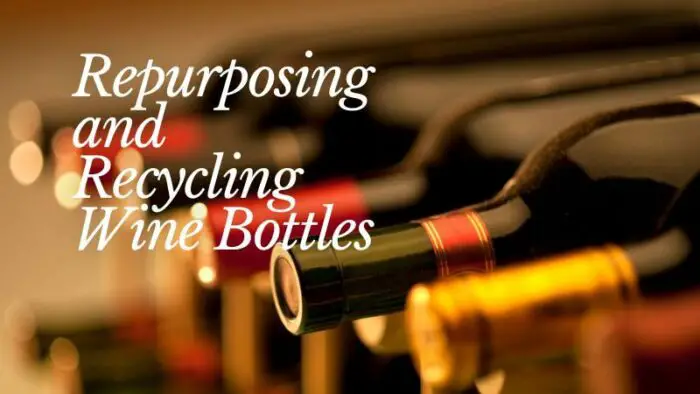Yes, you can throw away wine bottles. However, it is generally better for the environment to recycle them instead of throwing them away. Many recycling facilities accept wine bottles and other glass bottles and recycle them into new products, such as glass containers or even new wine bottles.
To recycle your wine bottles, you can usually place them in a recycling bin or bring them to a recycling center. Suppose you are unsure how to recycle your wine bottles in your area. In that case, you can check with your local waste management agency or look online for information about recycling options in your community.
Where to Recycle Wine Bottles
There are a few different options for recycling wine bottles, depending on where you live and the recycling facilities available in your area. Some possible options for recycling wine bottles include the following:
- Curbside recycling: Many cities and towns offer curbside recycling programs, in which you can place your wine bottles (and other recyclables) in a particular bin or container and set it out on the curb for pickup. Your local waste management agency can tell you what materials are accepted in your curbside recycling program and how to prepare them for pickup.
- Drop-off centers: Many communities have drop-off centers or recycling facilities where you can recycle your wine bottles (and other recyclables). You can usually find your nearest drop-off center’s location online or by contacting your local waste management agency.
- Retail recycling programs: Some stores, such as supermarkets and big box stores, have recycling programs that allow you to recycle your wine bottles (and other recyclables) while you shop.
- Special events: Some communities or organizations hold special occasions, such as “recycling days,” where you can drop off your wine bottles (and other recyclables) to be recycled. These events may be held regularly or once a year, so check with your local waste management agency or community organizations to see if any are scheduled in your area.
It is always a good idea to check with your local waste management agency or recycling facility to find out which materials they accept and how to prepare them for recycling. Some facilities may have specific guidelines for recycling wine bottles, such as requiring that the labels be removed or that the bottles be clean and dry.

Repurposing Wine Bottles
There are many creative ways to repurpose wine bottles, whether you have just a few leftovers from a party or a larger collection that you want to use for a craft project or home decor. Here are a few ideas for repurposing wine bottles:
- Turn them into vases: Wine bottles make great vases for flowers or other plants. You can leave the labels on for a rustic look or remove them and add your design using paint, markers, or other materials.
- Use them as candle holders: Wine bottles can also be used. Fill the bottle with sand or pebbles and place a candle in the center. You can also add decorations such as ribbons or stickers to the bottle to customize the look.
- Make them into bird feeders: Wine bottles can be repurposed by cutting a hole in the side and attaching a wire or string to hang it from a tree or other location. Fill the bottle with birdseed, and watch as your feathered friends come to visit.
- Use them as planters: Wine bottles can be used for small herbs, succulents, or other plants. Cut a hole in the bottom of the bottle, add soil and plants, and place the bottle in a sunny spot.
- Upcycle them into other home decor items: With creativity and basic craft supplies, you can transform wine bottles into various home decor items, such as lamp bases, wind chimes, or even a chandelier.
Remember to use caution when working with glass bottles, as they can be fragile and break easily. You may also want gloves and eye protection to protect yourself from cuts or other injuries.
What Happens When Wine Bottles Are Thrown Away?
When wine bottles are thrown away, they usually end up in a landfill, which can take hundreds of years to break down. Landfills are designed to contain and isolate waste materials from the environment, but they can still negatively impact the environment. Landfills produce methane, a potent greenhouse gas that contributes to climate change, and they can also release other pollutants into the air and water. In addition, landfills take up valuable space that could be used for other purposes, such as parks or housing.
Recycling wine bottles is a better option for the environment because it reduces the need for new raw materials and the amount of waste in landfills. When recycled wine bottles are recycled, they are typically crushed and melted to produce new glass products, such as bottles, jars, and other containers. Recycling wine bottles conserves natural resources, reduces greenhouse gas emissions, and reduces the energy demand compared to making new glass products from raw materials.
If you have wine bottles, you no longer need, consider recycling them rather than throwing them away. Many recycling facilities accept wine bottles and other glass bottles and recycle them into new products, such as glass containers or even new wine bottles. To recycle your wine bottles, you can usually place them in a recycling bin or bring them to a recycling center. Suppose you are unsure how to recycle your wine bottles in your area. In that case, you can check with your local waste management agency or look online for information about recycling options in your community.
Conclusion
Wine bottles can be recycled, repurposed, or thrown away. Recycling wine bottles is the most environmentally friendly option because it reduces the demand for new raw materials and the amount of waste in landfills.
There are various options for recycling wine bottles, such as curbside recycling programs, drop-off centers, retail recycling programs, and special events. You can also repurpose wine bottles by turning them into vases, candle holders, bird feeders, planters, or other home decor items. If you do choose to throw your wine bottles away, they will likely end up in a landfill, where they can take hundreds of years to break down and may negatively impact the environment.

